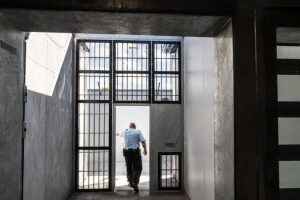Lock-up logic? It’s time to rethink the use of prisons

Peter Norden was a prison chaplain and has worked in prison ministry in Victoria for more than 40 years, many of them within the Dickensian confines of Pentridge Prison.
His newly released self-published memoir Seeking Justice in the Criminal Justice System in Australia reveals his unique perspective on a system that features not much justice and less system.
Peter Norden has gathered insights that few others could.Credit:Illustration: Matt Davidson
Over the decades of his working life, Peter Norden has gathered insights that few others could. Police, lawyers, prison officers, social workers, parole officers and the myriad of others struggling every day to keep the wheels turning often take one side or another of what has become a tribal divide. You are either with the cops or the crims. Peter did neither – he worked for his god and his church and whoever needed help.
He provided priestly solace to the families of the five prisoners who died in the appalling and preventable Jika Jika maximum security section fire at Pentridge in 1987. He was caught in the middle of the prosecutions that followed the horrific Walsh Street fatal ambush of two police officers in 1988.
For decades, he has been in and out of every prison in this state and a good many elsewhere. Like so many who have dedicated themselves to working to improve prisons and the courts, Peter Norden now argues for a complete rethink.
He has joined a lengthy and incredibly distinguished panel of retired judges from all courts including our High Court, politicians (state and federal from all parties), two former governors-general, prosecutors, doctors, Indigenous elders and leaders, former Australians of the Year, senior police, top lawyers (and a ratbag retired ABC Radio presenter) to argue that “jailing is failing” and it is time to stop tinkering at the edges of reform and re-imagine the system.
The Justice Reform Initiative asks why we keep doing the same things that have created the current crisis. Our incarceration rate is ballooning, recidivism is rampant and the costs are now unsustainable. Why do we still think this is a good way? When do we acknowledge the failures and embrace change?
The USA has long been a law-and-order temple. For decades, the mythology of “zero-tolerance” policing was successful retail politics, married to harsh mandatory sentences, supposedly to deter crime. It achieved no such thing and instead simply led to Third World prison conditions and brutal outcomes.
The pendulum has swung and both Democrats and Republicans are committed to change. Many European countries have long re-thought law and order arms races, rejecting the simplistic but populist call to simply lock up offenders and throw away the key. The dividends are being felt, as crime rates and recidivism decline and the cost burden slides with it.
NZ has pioneered “restorative justice” with great success, where many crimes are dealt with by community courts mediated by judges, using closely monitored and strictly supervised diversion programs that steer young offenders to education and job training instead of addiction and custody.
What is wrong with us? Why are we not listening? Why are we so slow to adopt best practice when the examples are there for us to learn from? Are we so caught in the cycle of law-and-order auctions in each election that we cannot see how destructive and wasteful a process it has become?
The undeniable truth is that the enforcement of the criminal law is heavily biased. Anyone of colour – particularly Indigenous men – are far more likely to attract the attention of police and harsher punishment from the courts.
While poverty is in no way a signifier of criminal disposition – plenty of poor people live entirely lawful lives – poor people struggle to navigate their way through the maze that is the law. It will shock nobody to be reminded that despite the best efforts of many over a long time everyone is not treated equally before the courts.
The mentally ill and intellectually disabled are particularly over-represented. Officially, over 50 per cent of people in prison have or have previously had a mental illness, although anybody who works in prisons will confide that the real figure is much higher.
We now spend over $3.6 billion every year on incarceration, at a per capita rate that exceeds all Western European nations and Canada. If the waste of money does not trigger your interest in justice reform, if compassion and equity do not spark your concern, there is also the saddest aspect of our current failure. The status quo even fails victims of crime, and ensures more of us will become victims in the future.
The tabloid appeal of “victim = good” and “offender = bad” does not stand up to the most superficial scrutiny. A victim today is often an offender tomorrow and likewise offenders are often victims.
There is no neat divide between the deserving and the damned. They are often the same people on different days of the year.
Jailing is failing. Can we cancel the law-and-order auction at this year’s state election and instead compete on who has the best plan for reform?
Jon Faine is one of over 100 patrons of the Justice Reform Initiative.
The Morning Edition newsletter is our guide to the day’s most important and interesting stories, analysis and insights. Sign up here.
Most Viewed in National
From our partners
Source: Read Full Article

